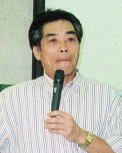NO.169ー6
| Summary of a Retreat Speech (Part 2) |
|
| Prof. Yuuji Suzuki, Hosei University |
|
Upon UNESCO's proposal and a decision of the United Nations, this year
is designated as the International Year for "The Culture of Peace".
"The Culture of Peace" is an idea which was born in the 50 year
history of the United Nations. It contains people's wish to create a culture
based on the love of peace.
For a long time, peace has meant a situation which has no wars among
nations. In the past 50 years, the number of large scale wars has decreased
and the Cold War has ended. Today, the flow of people, things, money and
information circulate globally and the walls between nations became lower.
However, the conflicts within a state, among ethnicities, religions, and
regions, have been increasing. In the 50 years after World War II ended,
we can count 39 conflicts with more than 1,000 victims and the numbers
are still increasing.(See ※1)
(※1) 39 conflicts with more than 1,000 victims in the 50 years after World War II until 1995.
Region
|
Asia |
Africa
|
Mid/South
America |
Europe
|
| Asia-Pacific |
Middle East |
| Conflicts |
11 |
7 |
12 |
3 |
6 |
| Death |
1,350,000 |
1,980,000 |
3,600,000 |
140,000 |
330,000 |
| Refugees |
1,950,000 |
3,070,000 |
6,750,000 |
100,000 |
1,880,000 |
|
Source:Regional distribution, number of conflicts, and the number of the dead
are from The International Dimension of Internal Conflict by Michael E Brown. ed., The IMT Press Massachusetts 1996, pp.4-7. The
number of refugees are from The Stage of the World's Refugees 1996, Oxford University Press, 1996. pp.248-250. edited by UNHCR.
Not only among nations but also in society in general, to create a situation
of peace is desirable. We now need to solve a fundamental problem--- how
can we prevent such conflicts?
It is becoming clearer that an obstacle which prevents the construction
of peace is a "gap". The most significant gaps are those among
ethnicity and religions. But the economical gap is at the base of them.
We now recognize that when we overcome the economical gap, we can resolve
some of the problems. For this, we must relocate the economical capability,
that is, the wealth. Japan has been working for 30 years to resolve the
economical gap among Asian countries which brought certain results. I am
sure we would be able to adjust the gap more efficiently if the citizens,
not only the governments, could make decisions on how to spend money.
The roles of NGOs, in cooperation with the governments, are becoming
larger and larger. Today, in a local community, there are more roles which
NGOs can easily handle. (※2)

Prof. Yuuji Suzuki |
|
(※2) What we can do and what we should do concerning theNGOs:
1st Generation of NGO: Ideas are for aid and social welfare. Actions are
for supply of goods.2nd Generation of NGO: Ideas are for small scale, self-help
regional development. Actions are for development of capability through
relocation of technology and knowledge.3rd Generation of NGO (we are in
this stage) : Ideas are for the development of sustainable systems. Actions
are for the coordination between governments and people. NGOs are cooperative
counterparts of the government. 4th Generation of NGO: Ideas are for innovation
of the social system. Actions are for the cooperation among NGOs.
|
|
It is very important to tackle difficult problems in a community. The
roles of a local community and of each person are becoming more significant.
What should we do now? The local government which scraps the least wastes
is Hawaii and they preserve a beautiful environment. For Peace, I would
like to say, "dump less wastes", "respect your neighbor",
and "keep a good relationship with your parents." We have to
turn our eyes to the ground we stand on. July 31, 2000
(The reporter is solely responsible for the article.)
Evaluations of the Retreat by Prof. Eiji HattoriProf. Hattori gave a long speech last year which was already reported in Short News No.159. This year he gave us an evaluation of the Retreat based on his experiences such as a visit to 85 countries and a research expedition of Silk Road. His evaluation was filled with love, suggestions, and touched our minds.
|
1) Concerning the theme of this year : "What we need and what we do not need in the next generation" ---
Free market is for the past. The leading principle for the 21st century
is "Compassion and Love." "Con" = together with or
to share. "Passion" =pathos, pain. (In an international conference
in Delhi, many intellectuals have concluded this.)
2) About International Marriage--- Japan was a country that experienced a stream of international marriages.
In the ancient era, Japanese accepted various people from Koreans to Tamils.
This phenomenon resulted in the rising of the original culture. Encounter
is very important. Wishing you may have many good encounters.
3) Words are culture, not a tool to communicate.
4) Conditions needed for workers in international organizations --- The first requirement is
a "Personality" and the second is "Language ability with
capabilities for judgement, analysis, and decision making"--- in this
order. There is no 3rd, or 4th requirement and the 5th is one's special
ability.
5) Joy of an encounter beyond national borders (which has only 250 years of history)--- it is
a great pleasure for me to meet so many people here. To express my delight,
I would like to say "You are the stars of our hope for the
21st century"
